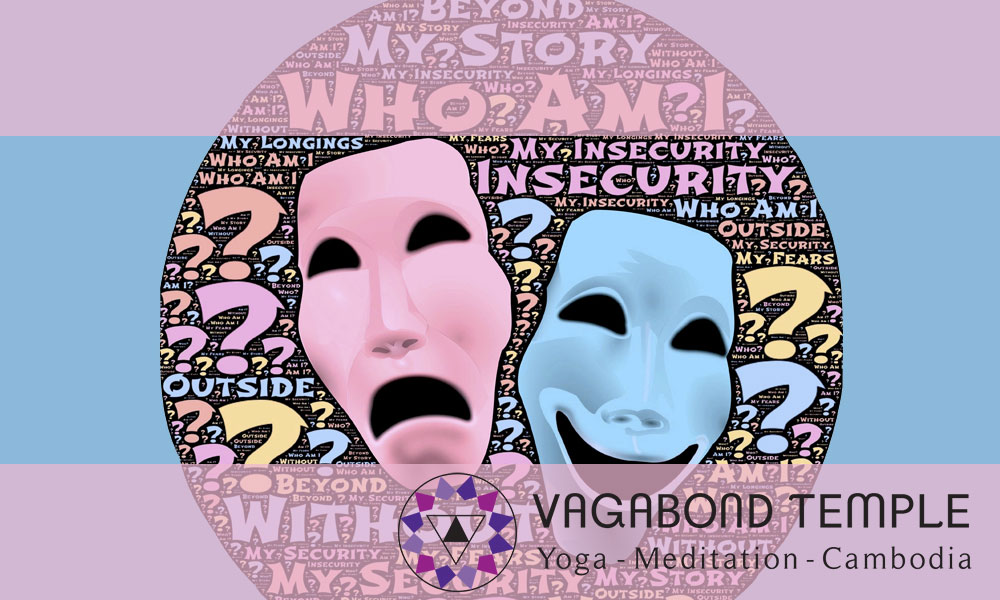Dropping The Drama – Finding Freedom Through Non-Attachment

When we practice meditation, generally we bring our attention to a single object (the breath, a mantra, part of the body etc.). Having only thing to focus on only one thing may sound easy, but actually it can be extremely challenging. The mind likes to pull us in many different directions, as anybody who has attempted to meditate will know.
Perhaps it is even harder in today’s world as we are so used to multi-tasking; this can be useful (working in a demanding job with multiple responsibilities) or not so useful (eating dinner while watching a movie and checking Facebook). For the mind that is familiar with being divided, sustained focus can seem an impossible task. While it is certainly possible to train the mind to relax and stay in the present moment using a meditation-object, for most of us this will not happen overnight.
While the world offers a million distractions, the biggest distraction actually comes from within. This distraction is so close to us that we may not even notice it, like the proverbial elephant in the room. One of the best ways to see it is simply to take a day examining the content of your thoughts. You may find a lot of the time you are just following associative patterns of thought, like browsing the internet clicking with one link leading to another. While these are distracting, they are not the big distraction…. however we are getting closer. If you continue to examine your thoughts you will find the ones that trouble you the most. These are the thoughts that really mess with your emotions and have your mind running in circles, whether you are trying to meditate or just going about your day. These are your thoughts that relate to your own personal soap-opera, the endless drama of “me!”. It is this drama, or more specifically our attachment to it that is the big distraction.
Examining The Drama
It is not so hard to find our inner soap-opera. Look for the thoughts that repeat themselves over and over, perhaps five or six different sentences forming a seemingly endless loop. These thoughts are often accompanied by unpleasant bodily sensations such as pain in the back, headache, tightness in the chest, or a queasy stomach. The story may be about somebody who has hurt us, “Oh my god I can’t believe they did x!”. Or perhaps it is a story of regret “Oh why did I do X? I’m such a terrible person!”. It could be a story of endless worry with no resolution “What am I going to do about Z??” Whatever the storyline, the underlying plot is the same: you are the main character and bad things are happening to you! For sure, bad things do happen, but often the endless internal storytelling causes us more pain than the event that triggered it.
Why Are We Attached?
If these stories bring us so much pain, then why do we not let go of them? The difficult truth is that we are attached to them, they bring us some kind of satisfaction. In the same way that exciting movies are more popular than clever ones, our internal drama is more interesting if there are clearly defined good guys, bad guys and tense situations. Even if we put ourselves in the role of the bad guy with a story based on self-criticism, we are still centre stage and this is attractive to the ego. Replaying these endless thoughts is painful, but the pain makes us feel alive. There is also a comforting familiarity that comes with indulging in thinking habits we have followed for many years – who will we be without our drama? Actually without the drama we will be much happier and able to deal with situations through sensible reflection instead of pointless freak-outs, but the mind may not realise this and prefer to stock up on popcorn and let the familiar stories play.
To go a little deeper into the reason for our attachment to drama, we can look at the “illusion of separation”. Many spiritual traditions including Buddhism, Tantra and Yoga view the separation between ourselves and the outside world as illusory. To wake up is to shatter this illusion and experience the truth of oneness. However, this is not as easy as our minds work over-time maintaining the idea of the separate self. So whatever story you are telling yourself, whether you are the hero or the victim, is reinforcing the idea of a “you” existing independently of everything else. This idea is very hard to let go of, as letting go threatens our comforting idea of who we are. Yet letting go of this is certainly worthwhile from a spiritual point of view – in Buddhism the belief in a separate self is said to be “ignorance”, the root cause of all suffering. Now that is dramatic!
Defusing The Drama
Once we recognise the stories and our attachment to them, they already start to lose their power over us. One method that helps is simply to allow the thoughts to run, feeling the accompanying sensations in the body. Instead of engaging with the stories and becoming emotional, try to see whatever comes up from a detached, non-judgemental perspective. The more power we give to these thoughts, the greater the likelihood they will keep returning but, if we simply allow them to play out, our minds will learn not to take them so seriously and they will fade. By allowing some distance between us and our thoughts we will see them from a higher perspective.
There will of course be times when something comes up that does require some thought. Say that you have had a falling out with somebody, and you are playing it over in your head. If you refrain from the drama that may start to arise, this could be an opportunity to engage in wise reflection. Like a scientist you can simply investigate your thoughts and feelings to figure out what has happened. Maybe the person reminds you of something from the past? Maybe there is a misunderstanding? However, most of the time we do not do this and go straight for the “oh my god! I can’t believe they would do X!” approach and the circle of painful yet strangely addictive thoughts will start again. If we are able to avoid this though, we may actually arrive at a decision that can allow us to move forward: perhaps we need distance from this person, or it could be we take action to repair the relationship. Either way, decisive action is preferable to endless thinking!
Real Love Is Not Attachment
Attachment is a big subject in many spiritual traditions, especially Buddhism which views it as a major cause of suffering. Whatever object, idea, person we are attached to – it can bring us suffering; if we do not have it we suffer, and if we do have it we will suffer when we lose it (and this loss is inevitable as nothing lasts forever). Of course there are things in our life that we treasure, and we will be sad to lose them, but this is not the same as attachment. Take the example of a loving relationship, you may feel lots of love for the other person, and this is a beautiful thing. But real love is not needy, it comes from a compassionate wish for the other’s happiness not your own. Attachment on the other hand is selfish, it can manifest in feelings of dependency or insecurity in the relationship as you have made your happiness dependent on somebody else. When a relationship ends, there will be pain – but for many people, their attachment brings much more suffering. Many people talk in very dramatic way about losing their soulmate, of being forever heartbroken (actually this is worse for spiritual types as they start imagining the partner they lost has been with them for multiple past-lives!). If you have ever felt these type of intense feelings you should really question if they are based on reality or if you have just walked into the movie theatre and are watching a tragic romance movie with you as the main character. If these feelings were based on unconditional love for the other person, you would simply want the best for them regardless of if they wanted to be with you. But if there is attachment you will be causing yourself unnecessary suffering by engaging in these stories. Our attachment to a person can result in us being attached to a story about the person, taking us another step away from reality and into the painful world of internal drama.
Making Friends With Change
As stated, the fact that our drama is so familiar to us makes it hard to let go of. This is a central problem we have as human beings, our fear of change. However, fear of change is really fear of reality itself, because everything changes. Even the body you are sitting in right now will not last forever. This may seem frightening, but when you really get it, when you really see the reality of change, it actually brings immense freedom. If you practice meditation and watch the thoughts and feelings, you will see how they arise, stay for some time and then vanish. After a while you will see that the stories playing out in your head, as dramatic and important as they seem, are also temporary – and this will stop you from giving them such importance. Understanding impermanence does not mean we should not enjoy our lives – in fact when we see the reality of the situation, we enjoy things even more as we experience love and beauty without the pain of attachment.
Freedom Awaits!
The attachment we have to our internal story is not easy to drop, but it is only when we drop it that we can move forward. Practices like meditation that bring us into the present moment can really help as they allow us to see the internal stories for what they are: temporary dramas that do not serve us at all. Once we are free from them, life becomes a lot more interesting than any movie!



